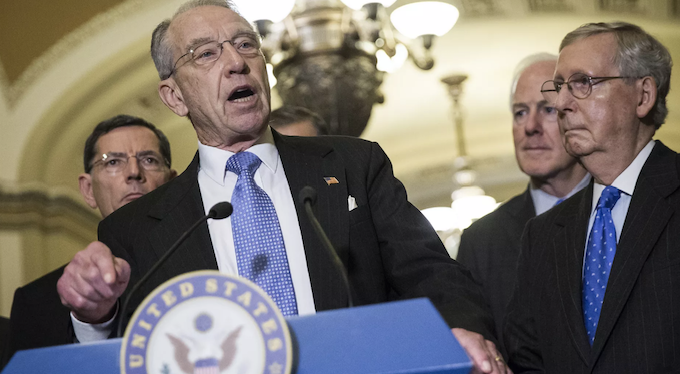Sixty-five years ago, the Supreme Court outlawed racial segregation in public education in the landmark Supreme Court decision Brown v. Board of Education.
As I reflect on the legacy of that monumental decision in advance of its 65th anniversary next Friday, I’m struck by Brown’s seminal role not just for Black Americans, but for our country. After that decision, our country’s stated principles of equality and justice for all slowly began to shift from aspirational ideals into federal law. Brown wasn’t just seminal for the Black community – it was seminal for our country.
Yet as I recognize the profound impact of the Brown decision, I’m equally disturbed by an emerging pattern from some of President Trump’s federal judicial nominees. During their nomination hearings, many of them have refused to affirm Brown’s legitimacy as a correctly decided case.
Taking such a position used to be unthinkable for judicial nominees. Until very recently, federal judges of every political stripe recognized Brown’s validity and judicial precedent. Even conservative Supreme Court justice Samuel Alito described Brown as “one of the greatest, if not the single greatest” Supreme Court decision, as have judges nominated by Republican presidents Ronald Reagan, George H. and George W. Bush.
But it’s becoming par for the course in the Trump era for his nominees to refuse to cede the point. And as the cousin of the civil rights lawyer who argued one of the five state cases that were decided in Brown v. Board, that affront isn’t just morally repugnant – it’s personal.
Blavitize your inbox! Join our daily newsletter for fresh stories and breaking news.
While working as a young attorney at the NAACP Legal Defense and Education Fund, Spottswood W. Robinson III (Uncle Spott to me) filed a suit on behalf of hundreds of Virginia high school students who protested their school’s leaking, poorly heated classrooms. Uncle Spott also advised then-lead attorney Thurgood Marshall and argued the case before the U.S. District Court and the Supreme Court. And next Friday marks 65 years to the day that, Uncle Spott helped to shatter a significant legal barrier to racial equality.
In addition to outlawing segregation in public education, Brown was the catalyst for integrating Black Americans into “mainstream” (white) institutions and society. And while the remnants of racial segregation still endure in our institutions and schools, no doubt, the impact Brown had on Black America is indisputable.
But unlike the judicial nominees of any other president, nearly all of whom have spoken plainly on the subject, Trump’s nominees demonstrate a calculated aversion to even talking about Brown, much less recognizing its significance in civil rights history. Their refusal to recognize its constitutional validity undermines the advances in racial equity that my cousin pushed forward and serves as yet another sobering reminder of Trump’s dangerous radicalization of our courts and political institutions.
It also indicates the steady normalization of race-related attacks under Trump. As he’s attacked asylum-seekers at our southern borders, banned Muslims from entering the U.S., and defended white nationalists as “very fine people,” he’s steadily codifying and reanimating racism into our laws and culture.
That’s precisely what’s at work when we consider Trump nominees’ judicial records and extremism. And their refusal to acknowledge Brown as correctly decided is even more pernicious precisely because it’s federal judges’ job to dispense equal justice under the law. If these nominees are confirmed, it’s all but certain that they’d roll back the clock on one civil rights decision after another.
After Brown, Uncle Spott went on to become a prominent federal judge and later, the first Black Chief Justice on the D.C. Circuit Court of Appeals, the second highest court in the U.S. And after his death, he received an honorary doctorate from New York Law School for his exemplary work to achieve and defend “true equality under the law for all Americans.”
As his family member, I’m still amazed by the tremendous impact Uncle Spott had on the lives of millions of people, and I’m so proud of his accomplishments. The ideals that drove his work— equality, fairness, impartiality and justice—are essential to preserving our hard-won rights. And it’s gravely concerning that during the Trump era, those values, which during my life have been held as the standard for federal judges, have been replaced with bigotry and extremism.
Confirming any judicial nominee who refuses to affirm Brown v. Board isn’t just a disgrace; it’s a disservice to our democracy. We must all be vigilant in our steadfast call for fair-minded judges who believe in equality and justice for all.
